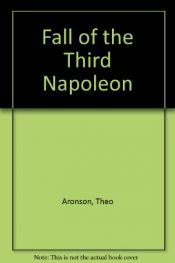The Fall of the Third Napoleon
Über
"A narrative which reads as easily as an historical novel, but is faithful to facts."Daily Telegraph
"The story is worked out like a film scenario, with cameras switching from court to street, from street to battlefield in a dramatic series. Mr. Aronson knows how to appeal to our visual imagination."
Spectator
"One can only greet with pleasure a book on a historically most fertile theme that may be called a popular work of considerable appeal and relevance."
History Today
"Mr. Aronson's style is clear and effective and not unduly overcoloured; while the portraits he draws of his unlucky protagonists are both sensible and sympathetic."
Financial Times
"We shall have a lot of 1870 this year but I shall be surprised if anything is written which is much better than this."
Books and Bookmen
The year 1970 marks the centenary of one of the great turning-points in world history: the outbreak of the Franco-Prussian war and the resulting downfall of the French Second Empire. For centuries, until the debacle of 1870, France had been mistress of Europe and Paris the capital of the civilized world. Then suddenly, in a matter of weeks, culminating in the Prussian victory at Sedan, the centre of European gravity swung from Paris to Berlin; Germany became the dominant country on the Continent and it took two of the greatest wars mankind has ever known to oust her from this position.
Under its creator, the romantic, inscrutable Napoleon III (‘a sphinx without a riddle', said Bismarck), and his beautiful Empress, Eugenie, the Empire had known 'eighteen years of luxury, pleasure, recklessness and gaiety, of gallantry and incomparable elegance'. In the spring of 1870 a massive vote of confidence in the so-called Liberal Empire had seemed to assure the future of the regime; yet, by the end of the summer, the French armies had suffered ignominious defeat; the Emperor himself had been taken prisoner at Sedan, and the bewildered young Prince Imperial, robbed of his hopes of military glory, had made his escape to England.
Eugenie, who had revelled in her dramatic role as Regent, could hardly bring herself to accept that total disaster had overtaken France. But, after one terrible outburst against the Emperor, she rallied with a courage that survived her escape from Paris, the proclamation of a Republic, the twilight years of exile in England, and the death of the Emperor.
The Prince Imperial was never to forget the shame of Sedan; anxious to prove himself worthy of his destiny, he met his death fighting with the British army in the Zulu War when he was twenty-three. The seventeen assegai wounds which killed him were all in the front of his body; and in his wallet was found a vicious French newspaper article raking up yet again the charge of Bonaparte cowardice.
The Fall of the Third Napoleon gives both a splendidly clear-cut analysis of the reasons for the collapse of the Empire, and a sympathetic, freshly angled presentation of the two main characters—of Napoleon, hardly the 'coward of Sedan' of his enemies' imaginings, and Eugenie who, though highhanded and impetuous, was far from the war-mongering virago of popular legend. The action takes place against a changing and colourful backdrop: Haussmann's grandiose Paris, the Taderies and Saint Cloud, the sodden roads and bloody battlefields of north-eastern France, a country house in Kent, a lonely hollow in the South African veld.. .
`It is all very beautiful—for the moment,' said Alfred de Musset at a ball at the Tuileries during the Second Empire, but I would not give two sous for the last act!' This book is the story of that last act—a gaslit tragedy, both brilliant and sombre.

 Deutsch
Deutsch English
English Español
Español










Mitglieder-Rezensionen Eigene Rezension schreiben
Schreibe die erste Rezension
Zum Kommentieren bitte Anmelden